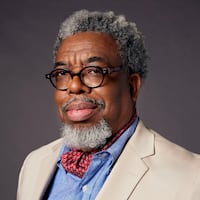For all that Jimmy Carter has accomplished in his almost 95 years, the one thing that almost eluded him was tenure, despite being governor of Georgia, the 39th president of the United States, a Nobel Peace Prize winner, and a member of Emory University’s faculty for 39 years
“They told me that I had to write a book,” Carter told a crowd of more than 2,000 at Emory University on Wednesday night. “So, I wrote a book. Then 10 books. Then 33 books. After 33 books, they finally gave me tenure.”
With Emory President Claire E. Sterk on the stage with him, Carter, Emory’s University Distinguished Professor, addressed first-year students for the 38th time — and the first time since Emory finally granted him tenure in June.
At the beginning of the program, students sang happy birthday and presented the former president with a giant card signed by the Emory community.
Carter will turn 95 on Oct. 1. His 92-year-old wife, Rosalynn Carter sat in the front row. When he stepped up to the podium, the big toothy smile that carried him from Plains to the White House was on full display.
After a brief round of thank yous, the former president told the students: “Now, with some trepidation, I will agree to answer questions.”
Carter, as he has gotten older, has been less of a speaker and more of a teacher in his public presentations. Usually, he gives a brief opening, then surrenders to questions from the audience.
On Tuesday, at a similar event at the Carter Center, he told the audience that the re-election of Donald Trump would be a disaster. But with the Emory students, the mood was lighter, with topics including animal favorites and nuts.
Still, “it was very influential for me,” said Rachel Ding, a 19-year-old Birmingham native and the Student Government Association president at Oxford College. “A lot of his values are idealistic in a good way and we should all adopt the values that Jimmy Carter holds dear.”
The students, 18- and 19-year-olds from all over the world, sent in more than 250 questions ranging from what motivates him to the best and worst advice he has ever gotten to the one book that inspired him the most.
The book is the Bible, although he has been hooked on Patrick O’Brian novels lately.
The worst advice came when he was in the White House and advised to bomb Iran in retaliation for the kidnapping of Americans who were working in the embassy.
“I could have killed 10,000 or more Iranians,” Carter said. “And they would have killed the 50 hostages. So, I tried to stay at peace with Iran.”
Carter didn’t dig too much into politics and didn’t say what candidate he would support in the Democratic primary. But he did say there was a good chance America could elect a female president when asked about the role of women in politics.
Elizabeth Warren and Kamala Harris are two of the top five Democratic hopefuls ahead of the 2020 election.
“The more women we have in elected office, the better off our country will be, the more peaceful our country will be,” Carter said. “Women, run for office, get elected and if you don’t get elected the first time, run again.”
A six-year-old named Eleanor asked what was his favorite animal in Africa, since he has been there so many times with his Carter Center work. The president reminded the crowd that his wife’s first name is Eleanor as well, then asked the child her favorite animal. She said cheetah.
“I really think an elephant is my favorite,” Carter said, trying hard to stay out of politics. “I don’t like elephants when they are transferred to be symbols of American policy. But I don’t think you can consider a donkey an African animal.”
Carter ended the evening answering a question that took him back to his Plains roots on the farm.
“As a peanut farmer, what are your thoughts on almond butter?” someone asked.
“I never have tasted it and I don’t intend to,” Carter said to raucous laughter. “We only have peanut butter in our house.”
About the Author
Keep Reading
The Latest
Featured




